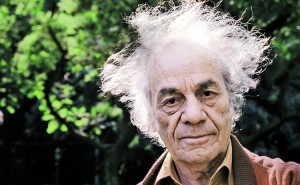Five poems by Alejandra Pizarnik, translated by Yvette Siegert.
Mendiga voz
by Alejandra PizarnikY aún me atrevo a amar
el sonido de la luz en una hora muerta,
el color del tiempo en un muro abandonado.
En mi mirada lo he perdido todo.
Es tan lejos pedir. Tan cerca saber que no hay.
from WORKS AND NIGHTS
© by Alejandra Pizarnik, 1965
© Myriam Pizarnik de Nesis, 2000 (Barcelona: Lumen, Random House Mondadori)
A Beggar Voice
by Alejandra PizarnikAnd still I dare to love
the sound of the light in the hours of deadness
the color of time on a ruined wall.
In my eyes I’ve lost everything.
Asking is so far away. And so close, this knowledge of want.
translated from Spanish by Yvette SiegertLos ojos abiertos
by Alejandra PizarnikAlguien mide sollozando
la extensión del alba.
Alguien apuñala la almohada
en busca de su imposible
lugar de reposo.
Eyes Wide Open
by Alejandra PizarnikSomeone sobs and measures
the lengths before dawn.
Someone punches her pillow
in search of an impossible
place of rest.
translated from Spanish by Yvette SiegertCuarto solo
by Alejandra PizarnikSi te atreves a sorprender
la verdad de esta vieja pared;
y sus fisuras, desgarraduras,
formando rostros, esfinges,
manos, clepsidras,
seguramente vendrá
una presencia para tu sed,
probablemente partirá
esta ausencia que te bebe.
Single Room
by Alejandra PizarnikIf you dare to frighten
the truth out of this old wall—
and its fissures, its gashes
that form shapes and sphinxes
and hands and clepsydras—
surely a presence
for your thirst will emerge,
and no doubt this absence
that drinks you dry will leave you.
translated from Spanish by Yvette SiegertEl corazón de lo que existe
by Alejandra Pizarnikno me entregues,
tristísima medianoche,
al impuro mediodía blanco
The Heart of What Does Exist
by Alejandra Pizarnikdo not hand me over,
oh saddest of midnights,
to the impure whiteness of noon.
translated from Spanish by Yvette SiegertSombra de los días a venir
by Alejandra PizarnikA Ivonne A. Bordelois
Mañana
me vestirán con cenizas al alba,
me llenarán la boca de flores.
Aprenderé a dormir
en la memoria de un muro,
en la respiración
de un animal que sueña.
Shadow from Days to Come
by Alejandra PizarnikFor Ivonne A. Bordelois*
Tomorrow
they’ll dress me in ash for the sunrise,
they’ll fill my mouth with flowers.
I’ll learn to sleep
inside the memory of a wall,
on the breath
of a dreaming animal.
* Bordelois is an Argentine linguist (PhD, MIT), writer, and scholar, and one of Pizarnik’s closest friends and literary interlocutors.
translated from Spanish by Yvette Siegert

